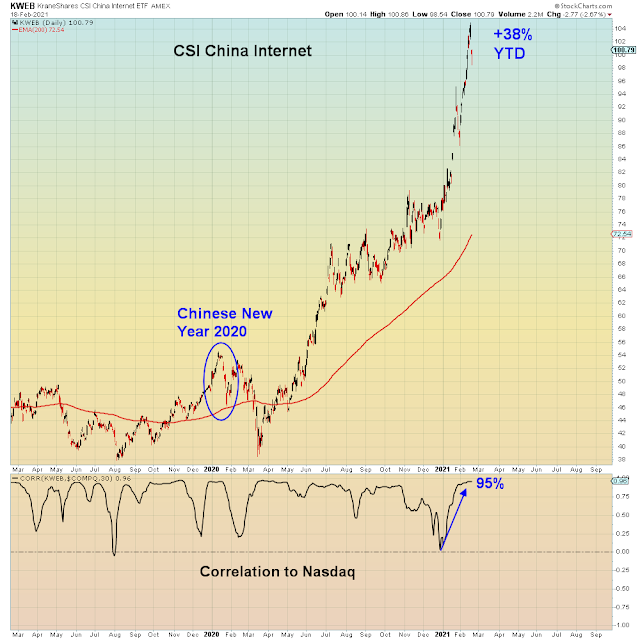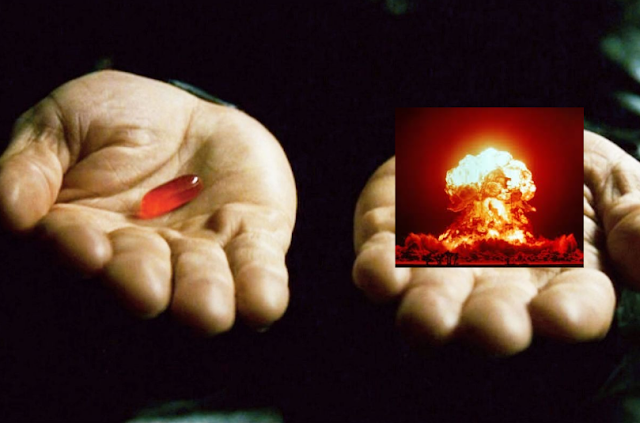Ammunition?
Fortunately, my apocalyptic paranoia peaked when the orange Anti-Christ left office. The old age home on both sides of the political spectrum was very disapproving of the sacking of the Capitol. Which cues up Stephen King's Running Man - a locked down populace watching anarchy spectacle on television for entertainment purposes. Every potential miscreant now in a NSA database for rapid retrieval. All of which gets us back to the real risk - what happens in the Capitol when the politicians are in session...
I will discuss reflation (lack thereof) further down in the post, but I think we all see where I stand on the topic:
SentimentTrader has some mind boggling charts on their Twitter feed depicting this manic melt-up. They are almost as bearish as I am. Record stock inflows, record volumes, record valuations, record SPAC junk issuance, record economic risk, really what's not to like?
Aside from the ubiquitous belief in free money, the belief among bullish denialists is that all of this speculation is confined to a relatively small part of the market. Hence, it won't have any impact on the S&P 500. This is the consensus view on Wall Street and therefore what misinforms today's mass complacency:
“Pockets of the market have recently demonstrated investor behavior consistent with bubble-like sentiment,” Goldman chief U.S. equity strategist David Kostin told clients. “But these excesses present low systemic risk to the broader market given their modest share of market cap.”
Recall that the same week that article was written, multiple hedge funds imploded and the overall stock market tanked due to the Gamestop pump and dump. According to Goldman, we are to believe that the only exposure hedge funds have to the Millennials is via their short book?
Which means that the bet now is that an entire generation can get margined out on Robinhood and that will have no effect on the overall market. What if we add in Fintech, Cloud stocks, Semiconductors, Emerging Markets, Work From Home darlings, Biotech stocks, the Russell 2000 small cap index, does that up the ante any?
Better yet, throw in big cap Tech:
Below is an index of the largest cap U.S. momentum stocks - Tesla, Apple, Microsoft, Amazon, Google, Nvidia, Paypal are the largest holdings.
What we see is that this index has now rallied three times off of the same level. Each rally is roughly one year in duration, each rally has been twice as manic as the prior one, compliments of ever-increasing stimulus dopium. Now this index is as overbought (top pane) as it was three years ago in 2018, and again in September of 2020. Which brings up a great quote from Doug Kass this week:
"No longer is the market hostage to the real economy or sales and profit growth – stuff I have spent four decades analyzing. Instead, liquidity is seen as an overriding influence, actually it has become the sine quo non. As such, historical valuations become increasingly irrelevant, and price momentum is the lodestar.“
The entire market has been turned into Gamestop - a momentum short squeeze on the way to explosion. Regulators' only concern is making sure everyone has equal access to self-implode.
The warning for how this all ends came two weeks ago when Goldman ignored systemic risk taking place in broad daylight. Record volumes were causing outages at every major retail broker. Now, they will experience far greater volumes, limit down moves, circuit breakers and offline brokers. The machines can't handle what's coming.
This week, CEOs of several companies associated with the Gamestop debacle will be testifying before Congress.
"The House Committee on Financial Services will hold the hearing on February 18, and will focus on “short selling, online trading platforms, gamification and their systemic impact on our capital markets and retail investors"
The focus of this scrutiny will primarily be on the "predatory" short sellers and the Robinhood brokerage which limited trading (buying) in Gamestop at the height of the madness. One could make the case that they saved investors huge amounts of money by preventing the stampede of newbie gamblers from buying into the Ponzi scheme. Nevertheless, the Reddit-organized pump and dump schemes at the center of this disaster have garnered the least concern and attention. Payment for order flow and the cozy relationship between Citadel and Robinhood is viewed as the greatest risk. Which means that while all eyes are focused on market makers scalping pennies in front of gamblers bidding up the junkiest stocks in the market - gamblers will be getting wiped off the map in pot stocks and penny stocks in broad daylight.
Which of these will be the greater systemic risk during meltdown? We already know the answer to that question. Because we are now seeing record down volume in a record overbought market. And we are seeing more broker outages now than we saw a year ago during the meltdown.
Which gets us back to the Goldman Sachs hypothesis regarding systemic risk - how is this a problem for the broader market? It's a problem, because all of this speculative volume is saturating trading platforms and making it harder to trade. When trades don't execute on a timely basis then gamblers will turn to market orders out of desperation which will increase volatility in a down market. Or they will use limit orders below the market to increase the odds of execution. Either way it will be a total gong show.
It's very clear now that Robinhood is nothing more than Candy Crush slapped on top of a Citadel dark pool. It was designed to attract as many new and assiduously uninformed young investors as possible. The parts of the plumbing that are missing are backoffice settlement which became the issue during the Gamestop debacle - they didn't have the working capital to fund two day settlement for the massive number of trades; but far more importantly what is missing is platform SCALABILITY from a technical perspective. Now, in the past several weeks they've increased their user base massively. This platform was not designed to handle the type of user traffic they are now generating. If they are still in business by the end of this year, I will be very surprised. The whole application is a time bomb waiting to explode.

In summary, what is being cast as a "populist" uprising of small investors is really just a late cycle rush into risk by the usual bagholders, while regulators do everything possible to ensure it happens as efficiently as possible.
As far as the real risk posed to markets, regulators have been asleep at the wheel for a year now:
February 2020:
"The do-it-yourself traders of r/WSB are waging a kind of guerrilla warfare in the markets, trying to exploit what they see as weaknesses in the system to move prices where they want them"
“This bull market is not going to end until the public falls in love with stocks, and that process may just be beginning”The forum’s zest for call options is a key force behind a broad market trend"
So, what to buy in a wholesale meltdown? This will be a recurring topic as the meltdown unfolds.
Initially of course, nothing. Stand back and watch the fireworks. When the smoke clears it will be a trader's market for some time to come - weeks, possibly months. Which means buy the dips and sell the rips in whichever trading vehicle one feels they can trust not to implode.
It took five weeks one year ago for central banks to get the stock market under control. Interestingly, gold was only down one week of that time, but it was a major dip. I am of course referring to paper gold - ETFs and futures.
As far as stocks go, unfortunately the bull market leaders of this era are highly overbought and overowned. When the Nasdaq crashed back in 2000, the index lost 80% of its value in two years, however there were some massive rallies along the way. This time, central banks will ensure that the trip lower is not a straight line. Nevertheless the leaders in the prior bull market rarely if ever lead again in the next bull market.
As far as inflation risks, I see a lot of articles recently predicting imminent inflation. I am not in that camp. I believe we will see extreme deflation on the other side of the crash. I also believe it will take several quarters before policy-makers generate enough combined fiscal and monetary stimulus to get prices moving. Of course, the vaccine and virus will be major factors as well. Initially, in the everything glut, prices will fall substantially. Cash will be king for quite a while longer, as human history's largest margin call runs its course.
I don't think that inflation is a major 2021 risk. 2022 maybe. I suspect the Fed will own the Treasury bond market the same way the BOJ owns the JGB market - by the end of this year.
Gamble at your own risk.


















































